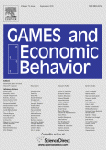 Authors: Francesco Feri, Miguel A. Meléndez-Jiménez, Giovanni Ponti and Fernando Vega-Redondo
Authors: Francesco Feri, Miguel A. Meléndez-Jiménez, Giovanni Ponti and Fernando Vega-RedondoTitle: Error cascades in observational learning: An experiment on the Chinos game
Source: Games and Economic Behavior
Abstract: The paper reports an experimental study based on a variant of the popular Chinos game, which is used as a simple but paradigmatic instance of observational learning. There are three players, arranged in sequence, each of which wins a fixed price if she manages to guess the total number of coins lying in everybody's hands. Our evidence shows that, despite the remarkable frequency of equilibrium outcomes, deviations from optimal play are also significant. And when such deviations occur, we find that, for any given player position, the probability of a mistake is increasing in the probability of a mistake of her predecessors. This is what we call an error cascade, which we measure by evaluating the (heterogeneous) Quantal Response Equilibrium which better suits our data. We also check the robustness of our findings when we allow for belief heterogeneity by applying Kübler and Weizsäcker's (2004) cognitive frame of limited depth of reasoning.
Recommended citation:
Feri, F., M.A. Meléndez-Jiménez, G. Ponti and F. Vega, 2011. "Error cascades in observational learning: An experiment on the Chinos Game", Games and Economic Behavior, 73 (1), September, pp. 136-146.
Further articles






